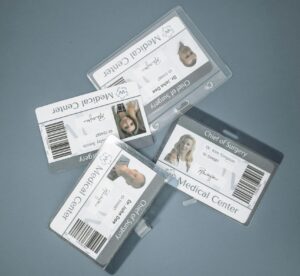by Elizabeth E. Hogue, Esq.
Imposter Clinicians
Although it is relatively rare, there are individuals who impersonate clinicians! Imposters will inevitably slip through the cracks despite concerted efforts by providers.
The First Offense
For example, Thomasina Amponsah recently admitted to posing as a licensed registered nurse at more than forty facilities in Maryland. Beginning in about September 2019 through approximately August 2023 Amponsah used stolen nursing credentials and false educational and professional histories to secure employment at multiple facilities. She was employed primarily at rehab facilities and nursing homes. She earned at least $100,000 in wages with her false credentials.
Amponsah used a Maryland nursing license number issued to another individual, thus making this individual a victim of identity theft. She then presented a copy of the victim’s license to potential employers. Amponsah altered her name on applications to include the victim’s last name. She falsely claimed that she had been a supervisor and that she had a nursing degree from Florida State University.

Adding Injury to Insult
Amponsah also used a second stolen identify to obtain employment. In July 2021 she submitted an online job application to a staffing agency. She used a Florida nursing license that belonged to another victim. Amponsah provided a copy of this victim’s license to the staffing agency along with a fictitious resume. She then worked for at least twenty-one different skilled nursing facilities on behalf of the staffing agency.
Imposter Identity Uncovered
Although several employers learned her true identity and terminated her employment, Amponsah continued to gain employment as a nurse in other facilities. She faces a maximum sentence of five years in federal prison for false statements related to health care matters and a mandatory two-year sentence served consecutively to any other sentence for aggravated identify theft.
A Common Occurrence
Then there is the recent case of a Pennsylvania woman, Shannon Nicole Womack, who posed as a nurse in four different states. She used various false names and paperwork while employed at twenty nursing homes and rehab facilities as a licensed practical nurse, registered nurse, and even nurse supervisor. Womack was charged with endangering the welfare of care, unlawful use of a computer, identity theft, forgery, theft by unlawful taking, and several other crimes.
Inherent Risks of Imposter Clinicians
There are many implications for services provided by imposters. One is, of course, the possibility of injuries to patients. Another is that providers may wonder if they are liable under the False Claims Act for services provided by unlicensed individuals.
Southern Maryland Home Health Services, for example, hired Diane Cannon as a physical therapist (PT) who was unlicensed, even though she claimed to be a fully qualified PT. In order to gain employment, Cannon used the name of an actual licensed PT and provided false references from supposed former employers. In addition, the provider’s hiring agent who interviewed her said that Cannon was familiar with PT terminology and procedures. While Cannon was employed, the provider did not receive any complaints about her that would have put the provider on notice that she was an imposter.
Agency Liability
Consequently, the U.S. District Court for the District of Maryland concluded that providers are only liable for false claims for services provided by imposters if some degree of culpability is attributable to employers other than simply employing an imposter. In other words, providers will probably not have any liability for filing false claims for imposters’ services so long as providers comply with their internal policies and procedures and state and federal requirements, and nothing occurs that puts employers on notice that staff members are imposters.
Final Thoughts
It is quite scary to think about the provision of healthcare services by unlicensed personnel. The consequences could certainly be dire for both patients and providers. However, vigilance by providers usually, but not always, pays off.
# # #


Elizabeth Hogue is an attorney in private practice with extensive experience in health care. She represents clients across the U.S., including professional associations, managed care providers, hospitals, long-term care facilities, home health agencies, durable medical equipment companies, and hospices.
©2025 Elizabeth E. Hogue, Esq. All rights reserved.
No portion of this material may be reproduced in any form without the advance written permission of the author.
©2025 by The Rowan Report, Peoria, AZ. All rights reserved.
|
|
|
|



